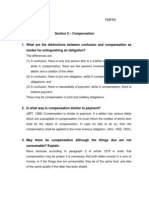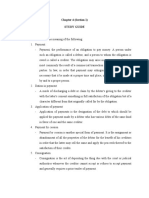Alternative Obligations Q&A
Alternative Obligations Q&A
Uploaded by
Nori LolaCopyright:
Available Formats
Alternative Obligations Q&A
Alternative Obligations Q&A
Uploaded by
Nori LolaOriginal Description:
Copyright
Available Formats
Share this document
Did you find this document useful?
Is this content inappropriate?
Copyright:
Available Formats
Alternative Obligations Q&A
Alternative Obligations Q&A
Uploaded by
Nori LolaCopyright:
Available Formats
Alternative Obligations
Chapter 3: Section 3 Alternative Obligations
I.
Definitions
1. Alternative Obligation - one wherein various prestations are due but the performance of
one of them is sufficient as determined by the choice which, as a general rule, belongs to
the debtor.
2. Facultative Obligation - one where only one prestation has been agreed upon but the
obligor may render another in substitution.
3. Conjunctive Obligation - one where there are two or more prestations and all of them
are due.
II.
Discussions
1. What are the limitations on the right of choice of the debtor in alternative obligations?
Illustrate one such limitation.
Answer:
According ART. 11200, the debtor cannot choose those prestations which are impossible,
unlawful, or which could not have been the object of the obligation. As an example, you
cannot kill someone in return for money, or deliver a horse with 10 legs from Mars in
return for something as well.
2. Give the situation when the debtor is given the option either to exercise his right of
choice or to rescind the contract with damages.
Answer:
According to ART. 1203, if through the creditors acts, the debtor cannot make a choice
according to the terms of the obligation, the latter may rescind the contract with
damages.
3. State the legal effects in case:
a) Some of the objects of the obligation are lost through the fault of the debtor who
has the right of choice.
Answer:
As stated in ART. 1204, if some of the objects of the obligation have been lost or have
become impossible even through the fault of the debtor, the latter is not liable since he
has the right of choice and the obligation can still be performed.
The Law on Obligations and Contracts 2003 Ed. Hector S. De
Leon
Alternative Obligations
b) All are lost through his fault.
Answer:
If all them have been lost or have become impossible through his fault, the creditor shall
have the right to indemnity for damages since the obligation can no longer be complied
with.
III.
Problems
1. D (debtor) borrowed P10,000 from C (creditor). It was agreed that D could pay
P10,000 or deliver his piano on August 22. On August 20, D informed C that the
former would deliver his piano. Can D still change his period considering that he was
given the right of choice?
Answer:
Yes, D can as long as he gains consent from C since according to ART. 1201, the choice
shall produce no effect except from the time it has been communicated. Also, as a
general rule stated in ART. 6, all rights may be waived.
2. Under a contract, X (obligor) promised to deliver to Y(obligee) item one, or item two
or item three. Y was given the right of choice. What is the liability of X in case,
through his fault:
a) Item two is lost or destroyed
Answer:
If the loss of one of the things occurs through the fault of the debtor, the creditor may
claim any of those subsisting, or the price of that which, through the fault of the former
has disappeared, with a right to damages.
b) All the item are lost or destroyed
Answer:
If all the things are lost through the fault of the debtor, the choice by the creditor shall
fall upon the price of any one of them, also with indemnity for damages.
3. S (seller) sold his TV set to B (buyer) who gave S the option to deliver instead his
refrigirator. Is S liable to B in case the TV is lost through Ss fault?
Answer:
Yes, S is liable. According to ART. 1206, if the principal thing is lost through the
debtors fault, he/she is liable for damages.
The Law on Obligations and Contracts 2003 Ed. Hector S. De
Leon
You might also like
- This Study Resource WasDocument2 pagesThis Study Resource WasCresenciano Malabuyoc100% (1)
- ObliCon Ch3 EsperancillaDocument3 pagesObliCon Ch3 EsperancillaEppie Severino50% (8)
- Psba-Qc Business Law 1 Questionnaires 1 QuizDocument5 pagesPsba-Qc Business Law 1 Questionnaires 1 QuizHanna Sobreviñas AmanteNo ratings yet
- Judicial Affidavit - SampleDocument5 pagesJudicial Affidavit - SampleNori Lola100% (4)
- Alternative Obligations (Arts. 1199-1206)Document9 pagesAlternative Obligations (Arts. 1199-1206)sweetlunacy00100% (9)
- Chapt 1 AssDocument1 pageChapt 1 AssMary Jescho Vidal Ampil50% (2)
- Philippine Oblicon Articles 1231-1260Document22 pagesPhilippine Oblicon Articles 1231-1260Danielle Alessandra T. Calpo100% (1)
- Obligations and Contract - de Leon, Chapter 1 SummaryDocument7 pagesObligations and Contract - de Leon, Chapter 1 Summarynisha100% (1)
- Article 1161-1165Document8 pagesArticle 1161-1165Ken Cruz100% (2)
- Oblicon Midterm Exam 1Document25 pagesOblicon Midterm Exam 1Dark Princess ShadowNo ratings yet
- Casumpang v. CortejoDocument2 pagesCasumpang v. CortejoNori Lola100% (1)
- Real Property Tax 3Document51 pagesReal Property Tax 3Nori Lola100% (3)
- Credit Transaction 1 PDFDocument19 pagesCredit Transaction 1 PDFLizglen Lisbos Gliponeo100% (2)
- Making Sense of Your Finance - CDP Account StatementDocument1 pageMaking Sense of Your Finance - CDP Account StatementLester ChongaelNo ratings yet
- Registration Completed SuccessfullyDocument3 pagesRegistration Completed SuccessfullySukrit JainNo ratings yet
- Chapter 3 (Section 3) AGCAOILIDocument3 pagesChapter 3 (Section 3) AGCAOILILeinard AgcaoiliNo ratings yet
- ACTIVITY2Document4 pagesACTIVITY2shara santosNo ratings yet
- Business Law Ch3s2Document2 pagesBusiness Law Ch3s2Cynara Joyce Balmadres100% (2)
- Joint and Solidary ObligationDocument18 pagesJoint and Solidary ObligationChristopher Celimen89% (37)
- Chapter 3 Section 6 On BUSLAWDocument1 pageChapter 3 Section 6 On BUSLAWTherese Chiu83% (6)
- WWW Law Activity 7 & 8Document4 pagesWWW Law Activity 7 & 8Tan ToyNo ratings yet
- Chapt 3 Sec 1Document3 pagesChapt 3 Sec 1Mary Jescho Vidal AmpilNo ratings yet
- ObliconDocument3 pagesObliconMonica Medina100% (2)
- WWW Law Activity 13 & 14Document4 pagesWWW Law Activity 13 & 14Tan Toy100% (2)
- Chapter 3, Sec.4: Joint and Solidary ObligationsDocument3 pagesChapter 3, Sec.4: Joint and Solidary ObligationsPrinces Emerald ErniNo ratings yet
- This Study Resource Was: Chapter 4, Sec.3: Condonation or Remission of DebtDocument1 pageThis Study Resource Was: Chapter 4, Sec.3: Condonation or Remission of DebtCresenciano MalabuyocNo ratings yet
- STUDY GUIDE Pages 329 330 369 370 387Document7 pagesSTUDY GUIDE Pages 329 330 369 370 387Jhonielyn Regalado Ruga100% (3)
- Chapter 4 (Section 2) Study Guide IDocument2 pagesChapter 4 (Section 2) Study Guide ILeinard AgcaoiliNo ratings yet
- Article 2142 2175 Quasi Contracts ParasDocument20 pagesArticle 2142 2175 Quasi Contracts ParasAljon Dimen100% (5)
- OBLICON REVIEWER Article 1159Document3 pagesOBLICON REVIEWER Article 1159Oh Seluring100% (1)
- Activity For Chapter 2 of ObliconDocument4 pagesActivity For Chapter 2 of ObliconCarlo Garcia100% (7)
- Art. 1207-1225Document11 pagesArt. 1207-1225Erika Rebato0% (2)
- Chapter 3, Sec.5: Divisible and Indivisible ObligationsDocument2 pagesChapter 3, Sec.5: Divisible and Indivisible ObligationsEilen Joyce BisnarNo ratings yet
- Alternative and Facultative ObligationsDocument28 pagesAlternative and Facultative Obligationslena cpa100% (2)
- Articles 1223-1225 (Divisible and Indivisible Obligations)Document21 pagesArticles 1223-1225 (Divisible and Indivisible Obligations)Paul Alvin Alvarez Torio100% (2)
- Article 1215 - Article 1230Document6 pagesArticle 1215 - Article 1230DinarSantos67% (3)
- HW1 LawsDocument8 pagesHW1 LawsMigz Borlongan47% (17)
- Chapter 4 (Section 6) Study Guide IDocument2 pagesChapter 4 (Section 6) Study Guide ILeinard AgcaoiliNo ratings yet
- Art. 1164. The Creditor Has A Right To The Fruits of The Thing From The Time The Obligation ToDocument3 pagesArt. 1164. The Creditor Has A Right To The Fruits of The Thing From The Time The Obligation ToKinitDelfinCelestial100% (3)
- Alternative and Facultative ObligationDocument2 pagesAlternative and Facultative ObligationDyan XyleneNo ratings yet
- Galicia-Module 2 Oblicon Ba11 PDFDocument3 pagesGalicia-Module 2 Oblicon Ba11 PDFJhonard GaliciaNo ratings yet
- Article 1284 & 1285Document12 pagesArticle 1284 & 1285Joneric Ramos100% (1)
- Report 1217-1227Document3 pagesReport 1217-1227Donato Galleon IIINo ratings yet
- Module 5 C Joint and Solidary Divisible and Indivisible ObligationsDocument11 pagesModule 5 C Joint and Solidary Divisible and Indivisible Obligationsairam cabaddu0% (1)
- Chapter 4 (Section 4) Study Guide IDocument2 pagesChapter 4 (Section 4) Study Guide ILeinard AgcaoiliNo ratings yet
- CHAPTER 3 - SECTION 5 Divisible and Indivisible Obligations 1223-1225 318-323Document4 pagesCHAPTER 3 - SECTION 5 Divisible and Indivisible Obligations 1223-1225 318-323LawStudent101412100% (1)
- What Do We Mean When We Say "Joint Indivisible Obligation"?Document2 pagesWhat Do We Mean When We Say "Joint Indivisible Obligation"?Danica BalinasNo ratings yet
- Requisites of Mora SolvendiDocument4 pagesRequisites of Mora SolvendiRoyce HernandezNo ratings yet
- OBLICONDocument7 pagesOBLICONBryan Arias100% (1)
- Art. 1175. Usurious Transactions Shall Be Governed by Special LawsDocument2 pagesArt. 1175. Usurious Transactions Shall Be Governed by Special LawsKinitDelfinCelestialNo ratings yet
- Article 1156-1174Document7 pagesArticle 1156-1174Ana Palomo100% (3)
- Novation Study-GuideDocument1 pageNovation Study-GuideAnn Go0% (1)
- ARTICLE 1158 To 1162Document9 pagesARTICLE 1158 To 1162JSPAMoreNo ratings yet
- Chapter 4 (Section 3) Study Guide IDocument2 pagesChapter 4 (Section 3) Study Guide ILeinard AgcaoiliNo ratings yet
- Contracts - Chapter 8Document2 pagesContracts - Chapter 8Leinard AgcaoiliNo ratings yet
- Chapter 3 Section 1 Pure and Conditional ObligationsDocument2 pagesChapter 3 Section 1 Pure and Conditional ObligationsLenny Ramos VillafuerteNo ratings yet
- Article 1210 - Article 1213Document2 pagesArticle 1210 - Article 1213EricaNo ratings yet
- Stipulation Pour Autrui NotesDocument2 pagesStipulation Pour Autrui Notesteabagman100% (6)
- Chapter 4 (Section 1) Study Guide IDocument4 pagesChapter 4 (Section 1) Study Guide ILeinard AgcaoiliNo ratings yet
- Article 1320-1340Document80 pagesArticle 1320-1340jonathan parba75% (4)
- Chap 3 Section 4 ObliconDocument6 pagesChap 3 Section 4 ObliconBela BellsNo ratings yet
- Chapters 3, 4 & 5Document3 pagesChapters 3, 4 & 5Lenny Ramos VillafuerteNo ratings yet
- Largojohnchristian AODocument3 pagesLargojohnchristian AOJohn Christian LargoNo ratings yet
- Oblicon Study Guide AnswersDocument7 pagesOblicon Study Guide AnswersAngielyn PamandananNo ratings yet
- Arts 1199-1206Document10 pagesArts 1199-1206Kareen BaucanNo ratings yet
- HANDOUT 15 Oblicon Online Class-1Document4 pagesHANDOUT 15 Oblicon Online Class-1Jamaica DUMADAGNo ratings yet
- INC Shipmanagement v. Camporedondo (2015)Document1 pageINC Shipmanagement v. Camporedondo (2015)Nori LolaNo ratings yet
- Statement of Facts DefendantDocument15 pagesStatement of Facts DefendantNori LolaNo ratings yet
- Career Awareness AssignmentDocument4 pagesCareer Awareness AssignmentNori LolaNo ratings yet
- POEA V Principalia Management, Sep 2, 2015Document1 pagePOEA V Principalia Management, Sep 2, 2015Nori LolaNo ratings yet
- Labor RelationsDocument3 pagesLabor RelationsNori LolaNo ratings yet
- Compensation Q&ADocument2 pagesCompensation Q&ANori LolaNo ratings yet
- Legal OpinionDocument3 pagesLegal OpinionNori Lola100% (1)
- Estj Extraverted Sensing Thinking JudgingDocument2 pagesEstj Extraverted Sensing Thinking JudgingNori LolaNo ratings yet
- People Vs Sea Lion Fishing CorpDocument7 pagesPeople Vs Sea Lion Fishing CorpNori LolaNo ratings yet
- Principles of Intl Environmental LawDocument23 pagesPrinciples of Intl Environmental LawNori LolaNo ratings yet
- People Vs Sea Lion Fishing CorpDocument7 pagesPeople Vs Sea Lion Fishing CorpNori LolaNo ratings yet
- Agrarian ReformDocument18 pagesAgrarian ReformNori Lola100% (1)
- Benevolent Neutrality TheoryDocument1 pageBenevolent Neutrality TheoryNori LolaNo ratings yet
- Fungiform Papillae Mushroom: Stratified Squamous EpitheliumDocument2 pagesFungiform Papillae Mushroom: Stratified Squamous EpitheliumNori LolaNo ratings yet
- Crim Pro AddendumDocument12 pagesCrim Pro AddendumNori LolaNo ratings yet
- CTA ProcedureDocument60 pagesCTA ProcedureNori LolaNo ratings yet
- Legal Forms CasesDocument68 pagesLegal Forms CasesNori LolaNo ratings yet
- Local and Real Property TaxDocument18 pagesLocal and Real Property TaxNori Lola100% (2)
- Value Added TaxDocument20 pagesValue Added TaxNori LolaNo ratings yet
- AVA CFC BukidnonDocument22 pagesAVA CFC BukidnonNori LolaNo ratings yet
- Taxation 1 OutlineDocument15 pagesTaxation 1 OutlineNori LolaNo ratings yet
- Credit Rating by Commercial Banks in KenyaDocument29 pagesCredit Rating by Commercial Banks in KenyaSimon MutekeNo ratings yet
- CIE O Level Principals of Accounts (7110) - Theory Notes (Collected)Document22 pagesCIE O Level Principals of Accounts (7110) - Theory Notes (Collected)MyshaM09957% (7)
- UACS Object CodeDocument42 pagesUACS Object CodeEric Luis CabridoNo ratings yet
- Direct Deposit Sign Up (BAC - NU)Document1 pageDirect Deposit Sign Up (BAC - NU)Cyber GemelasNo ratings yet
- Hongkong and Shanghai Banking Corporation: by Group: ThreeDocument14 pagesHongkong and Shanghai Banking Corporation: by Group: Threejain8687No ratings yet
- Simeon Del Rosario V The Shell Company of The Philippines LimitedDocument2 pagesSimeon Del Rosario V The Shell Company of The Philippines LimitedJohn YeungNo ratings yet
- Contract For The Sale and Purchase of CementDocument12 pagesContract For The Sale and Purchase of CementFilippo Del CaprifoglioNo ratings yet
- Surindra Pal Singh A05Document8 pagesSurindra Pal Singh A05Akhya GuptaNo ratings yet
- Receipt 25Document14 pagesReceipt 25THE OBSERVERNo ratings yet
- Murabaha 1Document10 pagesMurabaha 1Nauman AminNo ratings yet
- Project Exports PresentationDocument21 pagesProject Exports PresentationRavula RekhanathNo ratings yet
- Demat AccountDocument5 pagesDemat AccountHimanshu Das100% (1)
- Clpa Xii New Branches of AuditingDocument7 pagesClpa Xii New Branches of AuditingSARFARAZ AHMADNo ratings yet
- Appaloosa County Day Care Center, Inc.Document14 pagesAppaloosa County Day Care Center, Inc.Mary Myrick-Saddler0% (3)
- BA Agent Outlet List 2023Document1,812 pagesBA Agent Outlet List 2023nijhoom624No ratings yet
- W11980035-KC Exhibit IDocument4 pagesW11980035-KC Exhibit IAnonymous 0H0hbmNo ratings yet
- List of Active Prefer Nce SharesDocument1,731 pagesList of Active Prefer Nce ShareskenindiNo ratings yet
- Credit Union in The PhilippinesDocument4 pagesCredit Union in The PhilippinesJoyce-An Nicole MercadoNo ratings yet
- Quotation For Inspection WorkDocument1 pageQuotation For Inspection WorkMoe Oo Htun100% (1)
- Your accounts at а glance: ► Your balances оn 10 Oct 2023Document10 pagesYour accounts at а glance: ► Your balances оn 10 Oct 2023steam2210721No ratings yet
- Ihm Goa ProspectusDocument53 pagesIhm Goa ProspectusHarshitBabooNo ratings yet
- Airport Landside Signage-RFP For ConsultantsDocument12 pagesAirport Landside Signage-RFP For ConsultantspoketupiNo ratings yet
- RitzDocument2 pagesRitzप्रितम उत्तम लोखंडेNo ratings yet
- Ibrahim AbdulateefDocument289 pagesIbrahim AbdulateefkayboiNo ratings yet
- Buku Petunjuk Tata Cara Berlalu Lintas Highwaycode Di IndonesiaDocument17 pagesBuku Petunjuk Tata Cara Berlalu Lintas Highwaycode Di IndonesiadianNo ratings yet
- Second Division Anamer Salazar, G.R. No. 171998 PresentDocument19 pagesSecond Division Anamer Salazar, G.R. No. 171998 PresentYoonhae LeeNo ratings yet
- FM 1Document5 pagesFM 1READS RESEARCHNo ratings yet
















































































































